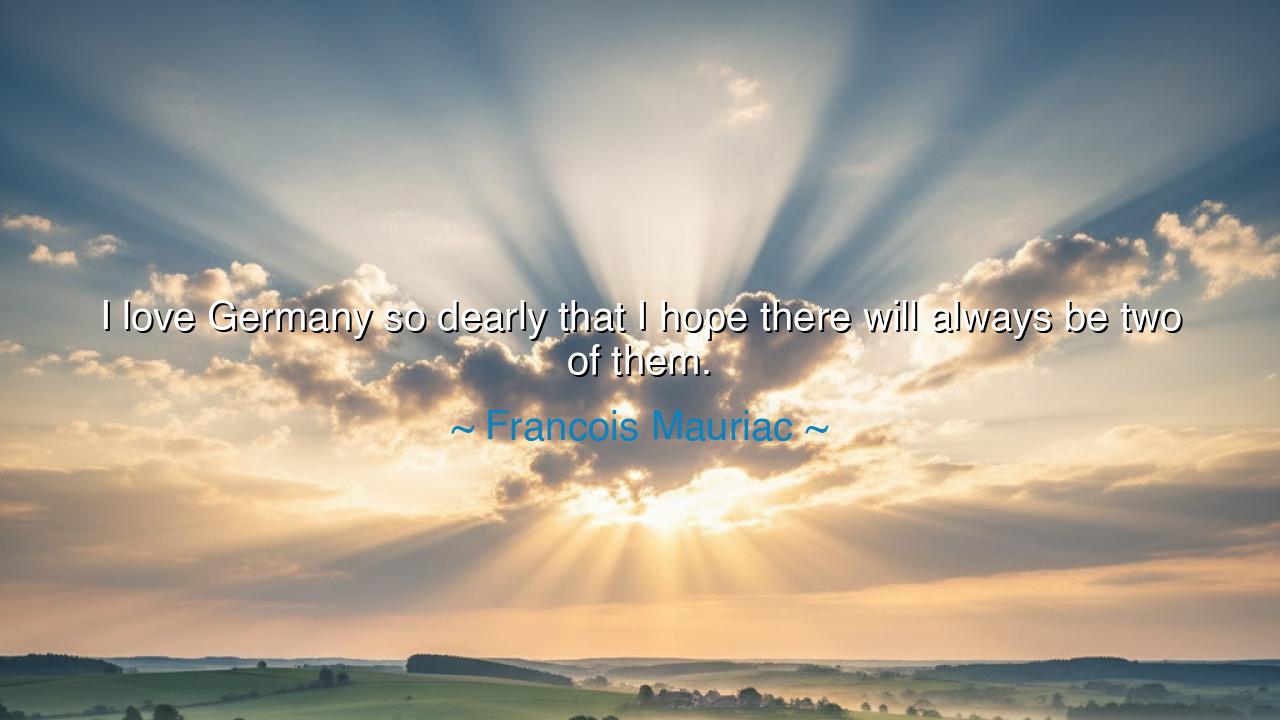
I love Germany so dearly that I hope there will always be two of






“I love Germany so dearly that I hope there will always be two of them.” Thus spoke François Mauriac, the French writer and moral philosopher, in the turbulent years of the Cold War, when the world stood divided not only by borders, but by fear and ideology. His words, at first glance, seem paradoxical—a declaration of love entwined with a wish for division. Yet within this paradox lies profound wisdom. Mauriac’s statement is not born of malice, but of memory; not of disdain, but of a desperate hope that the Germany of peace might never again merge with the Germany of conquest.
For Mauriac lived through two cataclysmic wars that began upon German soil. He saw the armies of the Reich march twice across Europe, leaving behind ruins, grief, and the silence of millions whose voices were extinguished. To him, Germany was both the land of Goethe and Bach, of philosophy and faith—and the land of Hitler and the Holocaust, of tyranny and fire. Thus, his love was not blind adoration, but a wounded affection: he loved the light of Germany so deeply that he feared its shadow. The division of the nation—East and West Germany—was to him a safeguard, a fragile barrier to prevent the reawakening of the monstrous unity that had once consumed the world.
In the ancient manner of lovers who know both devotion and dread, Mauriac’s words carry the tone of someone who loves too much to trust. He believed that Germany’s division was not a curse, but a form of repentance—a living reminder to humanity of the dangers of pride and unchecked power. The two Germanys, divided by the Berlin Wall, embodied the conflict within every civilization: the eternal struggle between the creative spirit and the destructive will. The poet and the conqueror dwell in the same heart, and history is the battleground where they meet.
Yet, as history unfolded, Mauriac’s wish would be both fulfilled and undone. For decades, Germany remained divided, and peace endured. The world’s gaze turned elsewhere, to new wars and new empires. But when the Berlin Wall fell in 1989, and Germany was made one again, it did not rise in violence. The unity that once terrified Mauriac returned, but this time tempered by sorrow, by remembrance, by the ashes of its past. Germany became a nation reborn not in fire, but in reflection—a testament to the idea that even the most fractured soul can be made whole when humility reigns where arrogance once ruled.
We may see in Mauriac’s words a universal truth, one not confined to nations. For within every human being there are also two selves—one capable of creation, and one capable of destruction. The wise do not seek to erase this duality, but to understand it. Just as Mauriac wished for a divided Germany to preserve peace, so must each person learn to govern their own divisions, to ensure that conscience reigns over ambition, that compassion restrains power. Unity without reflection can destroy; division without understanding can decay. The challenge of life is to hold both in balance.
Consider the story of Emperor Ashoka, the ancient Indian ruler who once conquered lands with cruelty and fire. After witnessing the horrors of his own making, he renounced violence and chose the path of Dharma, ruling henceforth with wisdom and mercy. Like Germany, he too was once divided—between the warrior and the sage, the tyrant and the teacher. His transformation stands as proof that even the darkest heart can be reconciled through truth and self-knowledge.
Thus, Mauriac’s paradox becomes not a condemnation, but a meditation on redemption. He loved Germany so much that he wished to preserve the conditions that would keep her gentle, humble, and introspective. He knew that power unchecked leads not to glory, but to ruin—and that sometimes, restraint is the highest form of love. His statement, cloaked in irony, is in truth a prayer: that the world might learn from its own divisions, and that no nation, no person, should ever again mistake unity for domination.
The lesson is this: to love deeply is to love wisely. Let not our longing for greatness blind us to the dangers of pride. In our nations, in our hearts, may we cherish the divisions that keep us human—the checks, the doubts, the moments of reflection that prevent us from becoming our worst selves. For if history teaches anything, it is that love without vigilance becomes idolatry, and power without humility becomes ruin. Mauriac’s words, forged in the fires of a wounded century, still whisper through time: beware the unity that forgets its sins, and treasure the division that preserves its soul.






AAdministratorAdministrator
Welcome, honored guests. Please leave a comment, we will respond soon